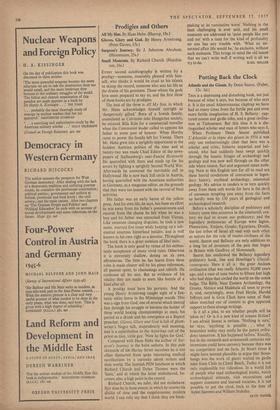Prodigies and Others
Surgeon's Journey. By J. Johnston Abraham. (Heinemann, 25s.) EVERY second autobiography is written by a prodigy—someone, insatiably pleased with him- self, who thinks it would be cruel to his talents to skimp the record, someone who sees his life as the drama of his greatness. Those whom the gods love seem prepared to say so, and the first three of these books are by prodigies.
The best of the three is All My Sins, in which Mr. Habe acknowledges himself outright as 'dangerously gifted.' Born of a Jewish family, assimilated as Calvinists into Hungarian society, he mistook Bela Kim for a commercial traveller when the Communist leader called to appoint his father to some post of honour. When Horthy came to power the family left for Vienna. There Mr. Habe grew into a sprightly opportunist in the feckless Austrian politics of the time and at twenty-two was made Chief Editor of the news- papers of Stalhemberg's near-Fascist Heimwehr He quarrelled with them and made up for his errors by fighting a sprightly Second World War. Afterwards he answered the inevitable call to Hollywood. He is now back full circle in Austria, having quarrelled with the American authorities in Germany, as a magazine editor, on the grounds that they were too lenient with the revival of Nazi activities.
His father was an early baron of the yellow press. And his own life, he says, has been an effort to win away from his father's possessiveness and recover from the shame he felt when he was a boy and his father was ostracised from Vienna. Like someone changing disguises, he took a new name, married five times while keeping up a sub- stantial amorous hinterland besides, and is well known in his own right as a novelist. Throughout the book there is a great mention of libel suits.
The book is only good by virtue of his enthus- iastic acceptance of many vivid roles. Otherwise it is extremely shallow, doting on its own effronteries. The little he has learnt from these roles is made clearer still by his pious references, all passion spent, to chastenings and rebirth. He confesses all his sins. But as evidence of his vitality they are made to seem like laurels of a kind after all.
A prodigy must have his portents. And the young Henry Armstrong caught sight of a fan- tastic white horse in the Mississippi woods. This was a sign from God, one of several which steered . him through his struggle to become the holder of three world boxing championships at once, his period as a drunk and his emergence as a Baptist preacher. Gloves, Glory and God is full of ghost- writer's Negro talk, stupendously well meaning, and is a contribution to the American cult of the priest as nice, virile guy. 'Now he fights for God.'
Compared with Hans Habe the author of Sur- geon's Journey is the babe unborn. In this pale chronicle of his Harley Street succe'sses he is too often distracted from quite interesting medical recollections by a curiosity about writers and their world. The Scottish PEN luncheon at which Richard Church and Dylan Thomas were the 'lions,' and at which the latter misbehaved, be- comes, alas, a high point in the record.
Richard Church, we infer, did not misbehave.
or does he in these essays, in which he renews his dislike of time and the megalomaniac modern world. I can only say that I think they are book- making at its ruminative worst. Nothing in the least challenging is ever said, and his small moments are addressed to 'quiet people like you and me' with a taste for the kind of profundity no one has any trouble with. 'What an un- aerated affair life would be,' he exclaims, without such moments. This brings to mind the old lesson that we can't write well if writing well is all we


































 Previous page
Previous page